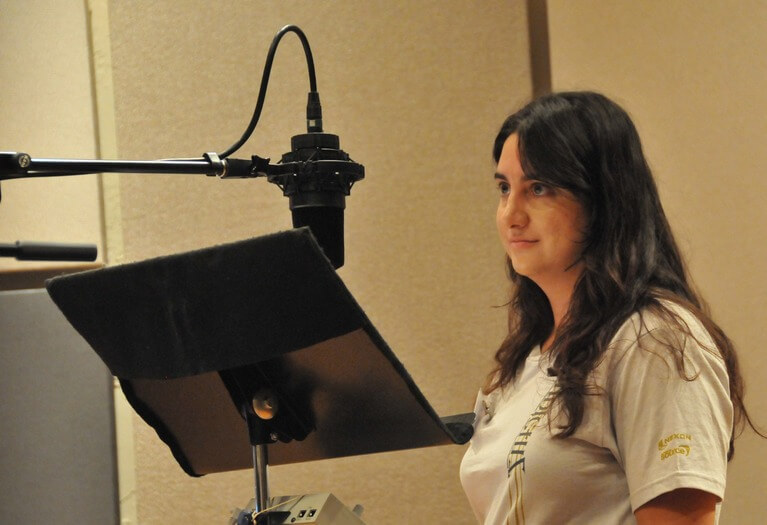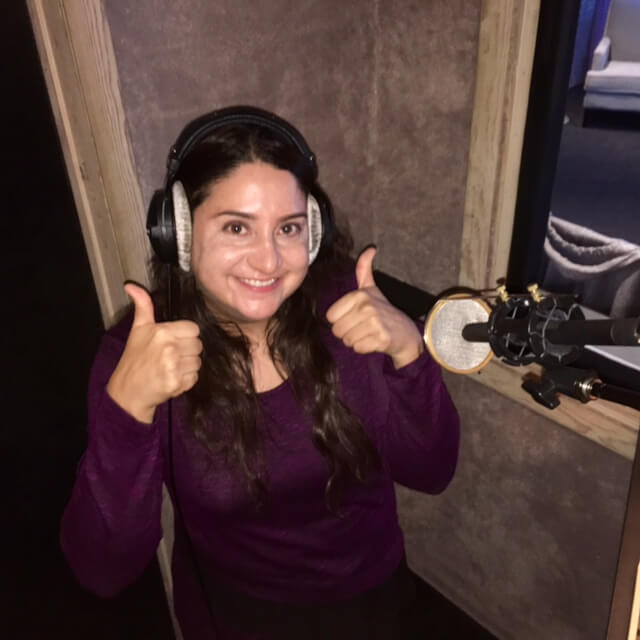
Want to guess how many times I get asked “How can I be a voice actor?”
I have no problem hearing the question, because I was asking it myself years ago. There is a problem, though. The advice that I tend to offer for free is typically ignored or unappreciated. It’s okay. I’m not bitter. But I do find it irritable when folks expect an easy way to get in, as though I could wave some magic wand and just turn them into legit voice actors. Or as one person asked me: “Could you help me get a lead on one of your shows?”
First let me just say that I fully respect anyone and everyone who has aspirations to do what they love, and I want to support individuals who are serious about pursuing their dream careers. However, there are those who want to bypass the work and rely on ego and attitude to get them places. I’m sorry to say, they probably won’t get too far. I’ve put in so much time to write emails full of information which I researched for days and days and in some cases received from genuine voice over resources themselves. Lately no one wants to read all the info; they want me to make a phone call and give fictional praise on their behalf because they believe they’re just as good as the talent working today. If I don’t know you personally and have never seen you act then it’s not going to happen. If you call one of my clients, agents or teachers and falsely claim that I recommended you when I didn’t, it really won’t happen. And to folks who use anger and bullying, it will NEVER happen. For everyone else, this is not meant to be discouraging; it’s meant to give some direction.
Back to what is said at the top of the page, “Knowledge is Power”, and the internet is a gold mine of knowledge. I’ve trained with numerous working voice actors, attended seminars and workshops by respected casting directors, networked for years with voice over talent who are my second family, and together we’ve all kept up with what’s current in the entertainment industry, the markets, the genres, conventions, workshops, tutorials and LOTS more through the internet and word of mouth. So instead of responding to emails and posting all the precious information I’ve put together, I’m going to put as best as I possibly can a condensed version here on my blog. Anyone who emails me asking the same questions will be sent a link here. If you are a potential voice actor, it’ll be your job to decide what to do with this information. Keep in mind two things though: Voice over is VERY competitive, and no matter where you are in your career, you shouldn’t EVER stop learning.

To be a Voice Over know first that acting is acting. I know of very few people who got into voice over work without being an actor first. Even if you only want to pursue commercials, narrations, or announcements, an acting class will benefit you in tremendous ways whether it be theater, film, or improvisation. You gain an understanding of what it means to be directed, how to use your voice correctly, and enhanced reading skills. If goals are focused towards animation, video games, anime or puppetry, acting classes are MUST. No excuses. Funny voices don’t make a character authentic, acting does. If you live somewhere that doesn’t have ongoing film, theater or improvisation classes to take in person fear not. Thanks to Skype, Zoom, Youtube and many others you can learn from a distance by attending webinars, online programs, group courses or one-on-one training with a reputable coach. Some names mentioned are people I haven’t trained with yet but through colleagues that I trust without any doubt whatsoever, I believe they’re experts worthy of notice. If there’s a name on my list of teachers that isn’t mentioned it’s due to one of two possible reasons: 1. I haven’t heard of the individual yet. 2. I have in fact trained with the individual and what they teach is false.
Everyone has a website these days so all you have to do is google their names for more info.
IMPORTANT NOTE ON DEMOS: Do not get a demo made until you’ve had enough training to start somewhere. False teachers/producers will try to talk you into letting them produce your demo when you’re far from ready. It’s an expensive mistake that can also damage your first impression to others. People remember bad demos. NEVER forget that. Visit http://www.videovoicebank.net for examples of top-notch demos. Listen to names (including celebrities) under agents like William Morris Endeavor, DPN, CAA, VOX Inc., CESD, SBV, AVO, Atlas Talent, Osbrink Agency, Coast to Coast Talent, Abrams Artists and Associates, and TGMD. Can you do what they do and sound believable?
Teachers I have trained with, most have expertise in more than one genre or market: Lisa Biggs (kid voices, voice acting toys), Everett Oliver (animation), Pat Fraley (audio books, animation), Cliff Zellman (commercials), Ginny McSwain (video games), Bob Bergen (animation), Dave Fennoy (video games), Joyce Castellanos (Promos), Mary Lynn Wissner (commercials), Katie Leigh (animation), Marice Tobias (commercials/narration), Richard Horvitz (animation), MJ Lallo (animation), Bill Holmes (commercials), Marc Cashman (commercials), Lani Minella (video games), Bruce Carey (commercials), Bob Michaels (commercials), John Swasey and Ned Lott (ADR Looping)
Demo Producers I have worked with or I have complete trust in: Chuck Duran, Marc Graue Studios, Susan Palyo at Voice Trax West, Cliff Zellman, Richard Horvitz, Nancy Wolfson, Roy B. Yokelson, David Rosenthal, Cristina Milizia
Voice Over Guides from Working Professionals in Animation, Video Games and Anime:
https://iwanttobeavoiceactor.com
http://www.kylehebert.com/
http://www.crispinfreeman.com/faq.html
Group/Private Training and Workouts for all kinds of Voice Over markets:
http://www.globalvoiceacademy.com/
http://www.voicetraxwest.com/classdescriptions/
http://www.fixinthemix.com/Voiceover_VO_Class.htm
Voice Over Blogs or Web Talk Shows:
http://www.nethervoice.com/nethervoice/
http://courvo.com/blog
http://blog.audioconnell.com/
http://www.vobuzzweekly.com/
Help with Marketing and more:
https://www.marcscottcoaching.com/lesson/marketing-for-success/
http://anneganguzza.com/services
http://www.celiasiegel.com/
Voice Over Communities:
http://www.vo-bb.com/phpBB2/
https://twitter.com/courvo/lists/voiceoverists (Also search for a plethora of groups on Linkedin, Facebook, Pinterest, etc.)
http://www.voiceoveruniverse.com/
http://www.voxyladies.com/
Voice Over Conventions:
http://www.voatlanta.me/
http://www.faffcon.com/ (working professionals only)
http://faffcamp.com/ (those starting out or already seasoned in VO)
http://www.world-voices.org (runs WOVOCON)
http://randythomaspresents.com/
http://www.midatlanticvo.com/
http://voxyladies.com/voxy-summit-2016/
http://www.midwestvoiceoverconference.com/
http://thatsvoiceover.com/
Home Recording Studio Experts:
Dan Lenard – www.homevoiceoverstudio.com/
George Whittam – http://www.vostudiotech.com/
Dan Friedman – http://www.sound4vo.com/
A few examples of Professional Voice Over Websites:
http://voiceoversandvocals.com/
http://bethchaplin.com/VO/
http://www.bernadettesullivan.com/
http://www.nazvoice.com/
http://www.lorialan.com/
http://www.mikematheson.com/
http://www.dbcoopervo.com/yeah/
Miscellaneous Resources:
http://www.voiceoverresourceguide.com/
https://www.audiopub.org/ (for audio book narrators)
https://www.voiceoverxtra.com/
Last but nowhere near the least are Don’ts and Do’s that I’ve compiled based on my own experiences. May you all follow your dreams and find success!
WHAT NOT TO DO
– Don’t stop in the middle of a recording. If you mess up during a recording or audition don’t ask the engineer to stop recording and don’t waste time apologizing, just go back to the beginning of a line or paragraph and start again. Engineers can edit out mistakes.
-Don’t offer suggestions to the director unless you are asked
-Don’t let any coach (no matter how reputable) convince you that you’re ready to make demo after 2-3 sessions, especially if you’re a beginner.
-Don’t have a friend make an edit for you unless they have extensive professional experience. It’s very easy to tell if an audio production was produced on cheap software ore a high quality studio. You want the best to make you sound the best.
-Don’t eat dairy products or a super heavy meal before a recording session.
-Don’t spend thousands of dollars on a home studio, ask around for advice on good microphones, recording software, speakers, headphones, etc.
-Don’t show up in person to hand studios, agents, or casting directors your demo. Look at their website for rules on submissions (if there are any), then call to see if the company has a casting department or ask who casts the shows/games. Most casting directors prefer a link to your demo from a website rather than an mp3 as they take up space.
-Don’t tell everyone about a project you’ve recorded on social media unless the client is okay with it. Overzealous anime and video game fans will do almost anything to get the gossip on who voiced what character. Wait until the studio makes a cast announcement online or ask them personally if it’s okay to share news about your latest voice over job.
-DON’T EXAGGERATE ON YOUR RESUME. People in this business do look up people and places that you list and if it’s not legit, word will spread super quickly.
-Don’t call studios, agents or casting directors saying someone referred you if it’s not true. You won’t be hired and more than likely never trusted as second time.
-Don’t strike up a conversation with another VO actor at an audition in person. If there’s a script for you to look over, read it, study the available information. Afterwards, make friends, but be respectful to those auditioning after you.
-Don’t beg for a job. Ask about upcoming auditions or share news of a recent project (without bragging) or a new voice over demo, but don’t e-mail clients specifically asking if they can give you a job.
WHAT TO DO
-Do be on time when recording in a professional studio, fifteen minutes early at best.
-Do let producers, casting directors or your agent know if you’re running late (traffic, accidents, events, etc.)
-Do pay attention to all direction given to you in a session
-Do ask questions if something doesn’t make sense, don’t give the director a hard time pretending you understand if you really don’t
-Do bring your own water. Some studios have some for you but not always.
-Do practice a script if the client sends you a copy to work with. If you can look at your script the day before recording READ it and PRACTICE out loud.
-Do always keep training in some way, take ongoing acting lessons, attend workshops, seminars, watch youtube videos, read articles, listen to other demos
-Do market yourself with business cards, postcards, CDs, websites,
-Do network with others at events (see conventions list) you never know who you might meet
-Do keep up with what’s happening in the industry. So many do not do this.
-Do make friends with other VO talent. Many pass jobs to each other or recommend friends to agents and studios.
-Do keep a positive attitude, it’s a VERY competitive business and everyone goes through ups and downs. Everyone. But if you’re negative, especially around people in the business, people will not want to work with you or recommend you to clients.
-Do take care of your body with vocal warm-ups, physical exercises, and good personal hygiene.
-Do research coaches, classes, to see if they’re legit, ask around forums, get REAL opinions, don’t necessarily rely on online testimonials alone.
-Do listen very carefully to demos. Recognize what sounds real and what sounds fake. A voice actor (even a coach) may say they can sound like a baby, kids, teens, but vocally they’re incapable of sounding authentic. If you can sound like a baby, have it on your demo or be prepared to have a dynamite audition. First impressions really do matter.
-Do take criticism and learn from it.
-Do have fun! Enjoy life!

